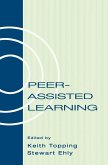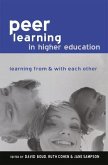Cognitive Perspectives on Peer Learning
Herausgeber: O'Donnell, Angela M.; King, Alison
Cognitive Perspectives on Peer Learning
Herausgeber: O'Donnell, Angela M.; King, Alison
- Gebundenes Buch
- Merkliste
- Auf die Merkliste
- Bewerten Bewerten
- Teilen
- Produkt teilen
- Produkterinnerung
- Produkterinnerung
The contribution of this book to the literature on peer learning is its focus on approaches to peer learning that are concerned with its underlying cognitive processes.
Andere Kunden interessierten sich auch für
![Learning Together Learning Together]() Nancy FalchikovLearning Together237,99 €
Nancy FalchikovLearning Together237,99 €![Working One-to-One with Students Working One-to-One with Students]() Gina WiskerWorking One-to-One with Students203,99 €
Gina WiskerWorking One-to-One with Students203,99 €![Peer-assisted Learning Peer-assisted Learning]() Peer-assisted Learning213,99 €
Peer-assisted Learning213,99 €![Learning in Groups Learning in Groups]() David JaquesLearning in Groups212,99 €
David JaquesLearning in Groups212,99 €![Peer Learning in Higher Education Peer Learning in Higher Education]() Peer Learning in Higher Education169,99 €
Peer Learning in Higher Education169,99 €![Peer-Group Mentoring for Teacher Development Peer-Group Mentoring for Teacher Development]() Peer-Group Mentoring for Teacher Development185,99 €
Peer-Group Mentoring for Teacher Development185,99 €![Writing for Peer Reviewed Journals Writing for Peer Reviewed Journals]() Pat ThomsonWriting for Peer Reviewed Journals168,99 €
Pat ThomsonWriting for Peer Reviewed Journals168,99 €-
-
-
The contribution of this book to the literature on peer learning is its focus on approaches to peer learning that are concerned with its underlying cognitive processes.
Produktdetails
- Produktdetails
- Verlag: Routledge
- Seitenzahl: 372
- Erscheinungstermin: 1. März 1999
- Englisch
- Abmessung: 235mm x 157mm x 25mm
- Gewicht: 689g
- ISBN-13: 9780805824476
- ISBN-10: 0805824472
- Artikelnr.: 20950468
- Herstellerkennzeichnung
- Libri GmbH
- Europaallee 1
- 36244 Bad Hersfeld
- gpsr@libri.de
- Verlag: Routledge
- Seitenzahl: 372
- Erscheinungstermin: 1. März 1999
- Englisch
- Abmessung: 235mm x 157mm x 25mm
- Gewicht: 689g
- ISBN-13: 9780805824476
- ISBN-10: 0805824472
- Artikelnr.: 20950468
- Herstellerkennzeichnung
- Libri GmbH
- Europaallee 1
- 36244 Bad Hersfeld
- gpsr@libri.de
Angela M. O'Donnell, Alison King
Contents: L.C. Wilkinson
Series Foreword. A.M. O'Donnell
A. King
Introduction. Part I:Cognitive Development Bases of Peer Learning: Overview.R. De Lisi
S.L. Golbeck
Implications of Piagetian Theory for Peer Learning. D.M. Hogan
J.R.H. Tudge
Implications of Vygotsky's Theory for Peer Learning. Part II:Cognitive-Elaborative Approaches to Peer Learning: Overview.N.K. Person
A.G. Graesser
Evolution of Discourse During Cross-Age Tutoring. A King
Discourse Patterns for Mediating Peer Learning. N.M. Webb
S. Farivar
Developing Productive Group Interaction in Middle School Mathematics. A.S. Palinscar
L.R. Herrenkohl
Designing Collaborative Contexts: Lessons From Three Research Programs. A.M. O'Donnell
Structuring Dyadic Interaction Through Scripted Cooperation. S.J. Derry
A Fish Called Peer Learning: Searching for Common Themes. Part III:Implications of Peer Learning for Teaching and Teacher Education: Overview.M.A. Cooper
Classroom Choices From a Cognitive Perspective on Peer Learning. M.S. Meloth
P.D. Deering
The Role of the Teacher in Promoting Cognitive Processing During Collaborative Learning. A.W. Hoy
M. Tschannen-Moran
Implications of Cognitive Approaches to Peer Learning for Teacher Education. T. Almog
R. Hertz-Lazarowitz
Teachers as Peer Learners: Professional Development in an Advanced Computer Learning Environment. A.M. O'Donnell
A. King
Concluding Remarks.
Series Foreword. A.M. O'Donnell
A. King
Introduction. Part I:Cognitive Development Bases of Peer Learning: Overview.R. De Lisi
S.L. Golbeck
Implications of Piagetian Theory for Peer Learning. D.M. Hogan
J.R.H. Tudge
Implications of Vygotsky's Theory for Peer Learning. Part II:Cognitive-Elaborative Approaches to Peer Learning: Overview.N.K. Person
A.G. Graesser
Evolution of Discourse During Cross-Age Tutoring. A King
Discourse Patterns for Mediating Peer Learning. N.M. Webb
S. Farivar
Developing Productive Group Interaction in Middle School Mathematics. A.S. Palinscar
L.R. Herrenkohl
Designing Collaborative Contexts: Lessons From Three Research Programs. A.M. O'Donnell
Structuring Dyadic Interaction Through Scripted Cooperation. S.J. Derry
A Fish Called Peer Learning: Searching for Common Themes. Part III:Implications of Peer Learning for Teaching and Teacher Education: Overview.M.A. Cooper
Classroom Choices From a Cognitive Perspective on Peer Learning. M.S. Meloth
P.D. Deering
The Role of the Teacher in Promoting Cognitive Processing During Collaborative Learning. A.W. Hoy
M. Tschannen-Moran
Implications of Cognitive Approaches to Peer Learning for Teacher Education. T. Almog
R. Hertz-Lazarowitz
Teachers as Peer Learners: Professional Development in an Advanced Computer Learning Environment. A.M. O'Donnell
A. King
Concluding Remarks.
Contents: L.C. Wilkinson
Series Foreword. A.M. O'Donnell
A. King
Introduction. Part I:Cognitive Development Bases of Peer Learning: Overview.R. De Lisi
S.L. Golbeck
Implications of Piagetian Theory for Peer Learning. D.M. Hogan
J.R.H. Tudge
Implications of Vygotsky's Theory for Peer Learning. Part II:Cognitive-Elaborative Approaches to Peer Learning: Overview.N.K. Person
A.G. Graesser
Evolution of Discourse During Cross-Age Tutoring. A King
Discourse Patterns for Mediating Peer Learning. N.M. Webb
S. Farivar
Developing Productive Group Interaction in Middle School Mathematics. A.S. Palinscar
L.R. Herrenkohl
Designing Collaborative Contexts: Lessons From Three Research Programs. A.M. O'Donnell
Structuring Dyadic Interaction Through Scripted Cooperation. S.J. Derry
A Fish Called Peer Learning: Searching for Common Themes. Part III:Implications of Peer Learning for Teaching and Teacher Education: Overview.M.A. Cooper
Classroom Choices From a Cognitive Perspective on Peer Learning. M.S. Meloth
P.D. Deering
The Role of the Teacher in Promoting Cognitive Processing During Collaborative Learning. A.W. Hoy
M. Tschannen-Moran
Implications of Cognitive Approaches to Peer Learning for Teacher Education. T. Almog
R. Hertz-Lazarowitz
Teachers as Peer Learners: Professional Development in an Advanced Computer Learning Environment. A.M. O'Donnell
A. King
Concluding Remarks.
Series Foreword. A.M. O'Donnell
A. King
Introduction. Part I:Cognitive Development Bases of Peer Learning: Overview.R. De Lisi
S.L. Golbeck
Implications of Piagetian Theory for Peer Learning. D.M. Hogan
J.R.H. Tudge
Implications of Vygotsky's Theory for Peer Learning. Part II:Cognitive-Elaborative Approaches to Peer Learning: Overview.N.K. Person
A.G. Graesser
Evolution of Discourse During Cross-Age Tutoring. A King
Discourse Patterns for Mediating Peer Learning. N.M. Webb
S. Farivar
Developing Productive Group Interaction in Middle School Mathematics. A.S. Palinscar
L.R. Herrenkohl
Designing Collaborative Contexts: Lessons From Three Research Programs. A.M. O'Donnell
Structuring Dyadic Interaction Through Scripted Cooperation. S.J. Derry
A Fish Called Peer Learning: Searching for Common Themes. Part III:Implications of Peer Learning for Teaching and Teacher Education: Overview.M.A. Cooper
Classroom Choices From a Cognitive Perspective on Peer Learning. M.S. Meloth
P.D. Deering
The Role of the Teacher in Promoting Cognitive Processing During Collaborative Learning. A.W. Hoy
M. Tschannen-Moran
Implications of Cognitive Approaches to Peer Learning for Teacher Education. T. Almog
R. Hertz-Lazarowitz
Teachers as Peer Learners: Professional Development in an Advanced Computer Learning Environment. A.M. O'Donnell
A. King
Concluding Remarks.









